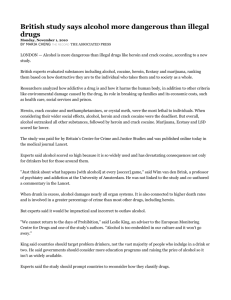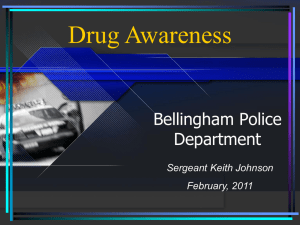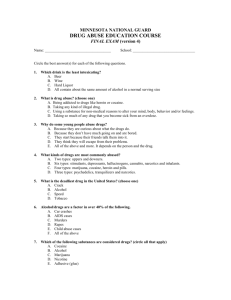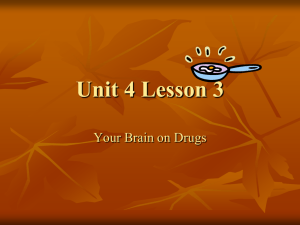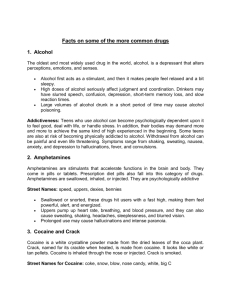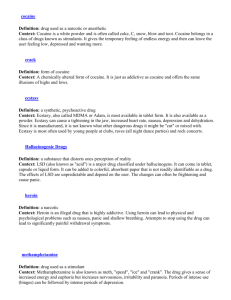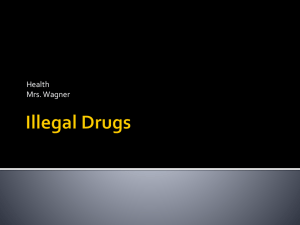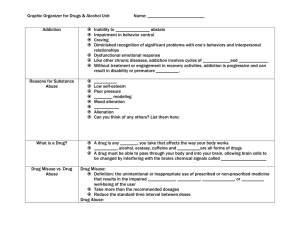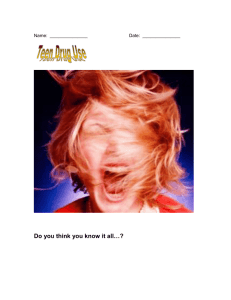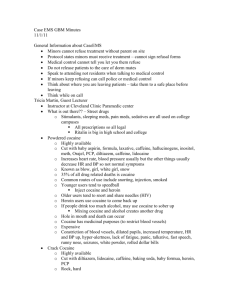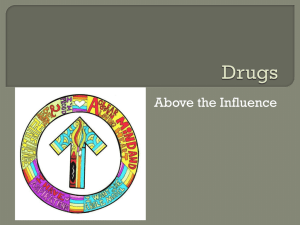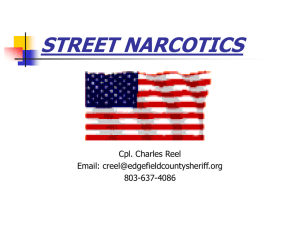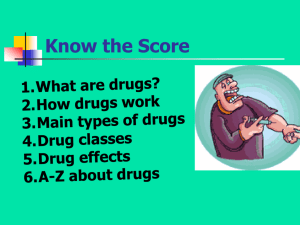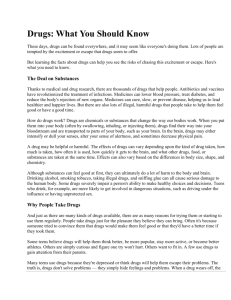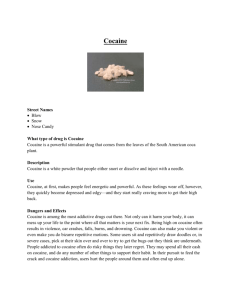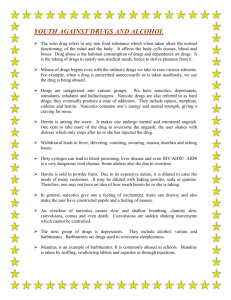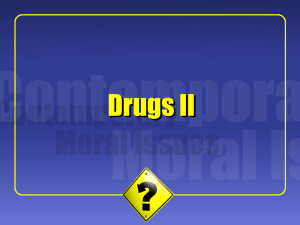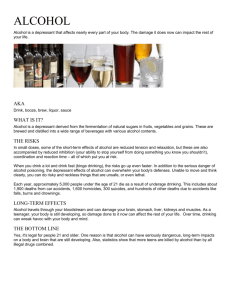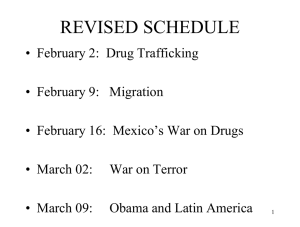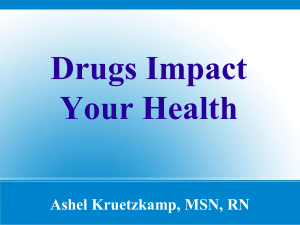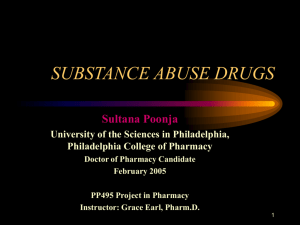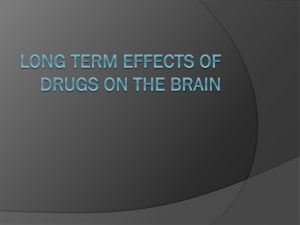Uppers, downers, and all
advertisement
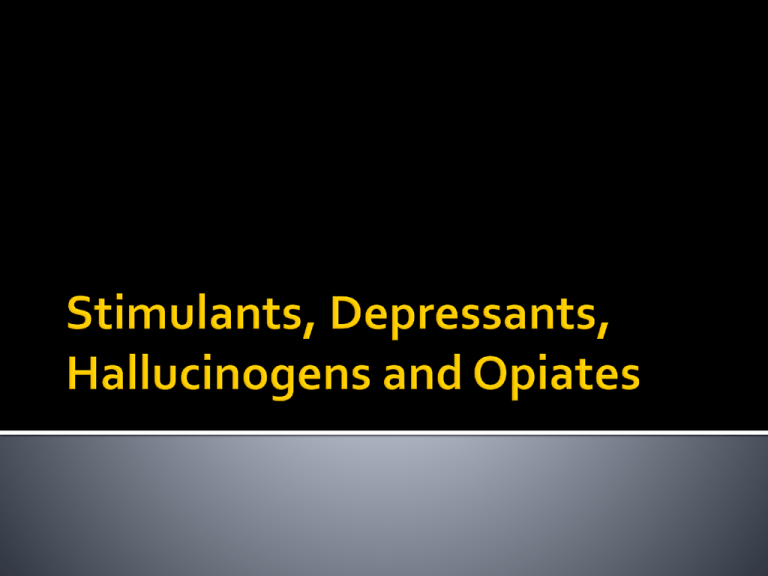
Drugs that temporarily increase a person’s energy, alertness Includes: ▪ Inhalants ▪ Ecstasy ▪ Cocaine (aka coke, crack, snow, crack cocaine) ▪ Methamphetamine (aka meth, crystal, ice) ▪ Amphetamines Drugs that cause relaxation, sleepiness Includes: Marijuana Rohypnol (aka roofies, date rape drug) DXM (legal ingredient in cough syrup) Tranquilizers Ketamine (aka Special K, “Kit Kat”, “Special K”) Drugs that distort perceptions and cause a person to see or hear things that are not there Users may experience “flashbacks” months or years later Includes: ▪ LSD (Acid) ▪ Psilocybin (Mushrooms) ▪ PCP (Phencyclidine, aka Angel Dust) All opiates come from the poppy plant. HIGHLY addictive Used as pain relievers, anesthetics, and sedatives In the medical field, highly valued for pain relief Includes: ▪ Heroin ▪ Opium ▪ Morphine ▪ Codeine Cocaine is a stimulant giving users a quick, intense feeling of power and energy. Cocaine elevates heart rate, breathing rate, blood pressure, and body temperature. Injecting cocaine can give you hepatitis or AIDS if you share needles. Snorting can put a hole inside the lining of your nose. First-time users — even teens — of both cocaine and crack can stop breathing or have fatal heart attacks. Using either of these drugs even one time can kill you (overdose). Addictiveness: HIGHLY addictive Even after one use, cocaine and crack can create both physical and psychological cravings (dependency) that make it very difficult for users to stop. Designer drug created by underground chemists. This drug is hallucinogenic with a stimulant effect Ecstasy can also cause increased heart rate, dry mouth, cramps, blurred vision, chills, sweating, and nausea. Sometimes users clench their jaws while using. They may chew on something (like a pacifier) to relieve this symptom. Many users also experience depression, paranoia, anxiety, and confusion. There is some concern that these effects on the brain and emotion can become permanent with chronic use of ecstasy. Ecstasy also raises the temperature of the body. This increase can sometimes cause organ damage or even death. Addictiveness: Physical addictiveness of Ecstasy is unknown, teens can become psychologically dependent upon it to feel good, deal with life, or handle stress. Heroin gives a burst of euphoric feelings. This high is often followed by drowsiness, nausea, stomach cramps, and vomiting. Users feel the need to take more heroin as soon as possible just to feel good again (the “high” doesn’t last long- never as good as the first) With long-term use, heroin ravages the body. It is associated with chronic constipation, dry skin, scarred veins, and breathing problems. Users who inject heroin often have collapsed veins and put themselves at risk of HIV, hepatitis B or C, and bacterial endocarditis (inflammation of the lining of the heart) if they share needles with other users. Addictiveness: Heroin is extremely addictive and easy to overdose on (which can cause death). Withdrawal is intense and symptoms include insomnia, vomiting, and muscle pain. Substances that are sniffed or "huffed" to give the user an immediate rush or high. Include household products like glues, paint thinners, gasoline, sharpie pens, white-out, hair spray, aerosol deodorants, and spray paint. Inhalants make users feel giddy and confused. Long-time users get headaches, nosebleeds, and may suffer loss of hearing and sense of smell. Inhalants cause severe toxic reaction and death. Using inhalants, even one time, can kill you. Addictiveness: Inhalants can be very addictive. Teens who use inhalants can become psychologically dependent upon them to feel good, deal with life, or handle stress. Most widely used illegal drug in the U.S. Affects mood and coordination. Users may experience mood swings that range from stimulated or happy to drowsy or depressed. Elevates heart rate and blood pressure. Some people get red eyes and feel very sleepy or hungry. The drug can make people paranoid or cause them to hallucinate. Causes slowed thinking ability, loss of short-term memory, anxiety, loss of balance and coordination. Causes Gynecomastia in males (growth of breast tissue) Marijuana is as tough on the lungs as cigarettes — steady smokers suffer coughs, wheezing, and frequent colds. Causes lung cancer. Addictiveness: Teens who use marijuana can become psychologically dependent upon it to feel good, deal with life, or handle stress. Their bodies may demand more and more marijuana (build tolerance) to achieve the same kind of high experienced in the beginning. Main ingredient: Psuedoephedrine Other ingredients: Battery acid, gasoline, drain cleaner, paint thinner, car brake cleaner, etc. Powerful stimulant: Users feel a euphoric rush from methamphetamine. Tolerance develops quickly — users will use more meth for longer periods of time, resulting in sleeplessness, paranoia, and hallucinations. Users sometimes have intense delusions such as believing that there are insects crawling under their skin. Prolonged use may result in violent, aggressive behavior, psychosis, and brain damage. Addictiveness: Methamphetamine is highly addictive. http://www.youtube.com/watch?v=nT9sUA82KHc Effects are not predictable- can differ each time Effects include: increased energy, altered sight, smell, taste, sound, touch Causes confusion, panic, anxiety, huge emotional swings Users may vomit, become dizzy, have strange or frightening thoughts Flashbacks occur days, weeks, months, or years after If the wrong mushroom is taken, users can experience stomach pains, vomiting, diarrhea, or even death Synthetic versions of testosterone Using illegally can cause: Males: stunted growth, paranoia, liver cancer, heart disease, severe acne, going bald, shrinking of testicles, reduced sperm count, infertility Females: severe acne, deeper voice, increased facial hair, going bald, disrupted menstrual cycle, rapid weight gain, infertility You don’t have to give up on friends in order to stay drug free Use refusal skills when offered Let your friends know ahead of time that you’re not interested Think fully about your decision to try drugs: Is there a chance to get addicted? What happens after the high is over? What if you feel sick? What is the benefit of the drug? What are the legal consequences? Jail? Prison? What would your family think? How can this affect your future? 1. Admit there is a problem 2. Tell a trusted adult 3. If you have a friend that uses, stage an intervention: confront them about their problem. Get family and friends to help. 4. Detoxification: Medical treatment to help control the severe side effects as well as intense cravings of the withdrawal process 5. Rehabilitation: treatment for dependency or addiction of drugs 6. Recovering: the process to learn to live without drugs; begins in rehab, continues throughout life
